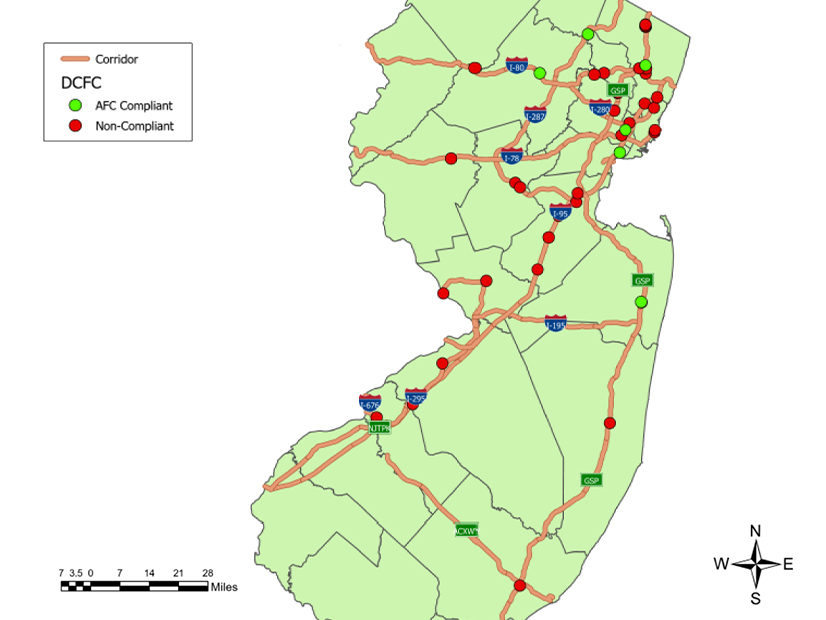
A rest stop operator is negotiating with the New Jersey Turnpike Authority (NJTA) to install electric vehicle chargers along the state’s two main highway arteries under a $166 million program, according to the agency.
The NJTA board on March 28 authorized the continuation of talks with Applegreen NJ Welcome Centers, which operates restaurant facilities at rest stops along the New Jersey Turnpike and the Garden State Parkway, which also is managed by the authority. Applegreen, based in Ireland, sells food and fuel at 121 sites in the U.S. Northeast and South.
Service areas on the two highways currently host 76 chargers — 70 on the turnpike and six on the parkway, NJTA spokesperson Tom Feeney said. Of the turnpike chargers, 64 are operated by Tesla, six by EVgo, which also operates all six on the parkway, he said.
The authority’s announcement comes as the state seeks to increase the number of chargers statewide, believing — like other states — that a key element to jump-starting a broad embrace of EVs is to remove the fear that a vehicle could run out of power with no charging nearby to replenish the battery.
New Jersey has 943 public charging locations, 164 of which offer DC fast chargers and 802 offering Level 2 charging, according to the public EV charging locator run by the New Jersey Department of Environmental Protection. About 95% of the state is within a 25-mile radius of a DC fast charger, according to the site.
About 90,000 EVs are registered in New Jersey, a small fraction of the 6 million light-duty vehicles on the road, but a big jump up from approximately 30,000 EVs in the state at the end of 2019. New Jersey policy calls for 330,000 light-duty plug-in electric vehicles registered in state by 2025, along with 400 fast chargers and more than 1,000 Level 2 chargers by the same date.
Expanding the Charger Network
Feeney said the talks with Applegreen have not yet determined where and how many chargers would be installed if negotiations are finalized. But the deal would “greatly expand the number of EV charging stations at turnpike and parkway service areas,” he said.
Elements of the deal already have been agreed to, according to the authorization approved by the agency. Applegreen “will construct EV charging facilities and construct or secure the construction of related utility infrastructure at authority rest service areas,” the order says. The company also will operate and manage the facilities, the order says.
NJTA would pay $24 million in the deal, but there has been no agreement on “customer pricing structure or revenue sharing,” according to the order.
Pamela Frank, CEO of ChargEVC-NJ, a coalition of industry groups, consumer advocates and environmentalists that promotes EV adoption, welcomed the announcement and especially the authority’s $24-million commitment to the project.
“It’s a very good initiative,” Frank said, adding that she expects the deal to add hundreds of chargers along the two highways. “The good news is you’re going to see [chargers] on the parkway; you’re going to see [them] on the turnpike on all of these stops that are owned and operated” by the contractor, she said.
The biggest benefit, however, could be that the project will bring the power cables from the grid needed for chargers at the rest stop charging site, which is often the biggest cost to the charging station, she said. So even if there are not many plugs at the start, due to the limited demand at present, they can be easily added.
New Jersey ranks 15th among states in the number of publicly available non-Tesla fast chargers, according to an analysis of federal data by ChargEVC-NJ, Frank said, noting that seven East Coast states rank higher. The state has about one public EV plug per 24,000 vehicles of all kinds on the road, about the same as the U.S. as a whole, she said.
Multiple Incentive Programs
The federal government awarded the state $104 million in funds from the National Electric Vehicle Infrastructure (NEVI) program, which requires states to identify alternative fuel corridors (AFCs), major state and interstate highways where EV charging stations would be located every 50 miles. EVs can fully recharge in about an hour using the fast-charger ports now available.
Under the first phase of New Jersey’s NEVI plan, from 2022 to 2024, state officials designated 12 highways as AFCs, among them the turnpike and parkway. The plan calls for the state to use the NEVI funds to install four 150-kW chargers at least every 50 miles at locations less than a mile from the highway exit.
The state also has several of its own funding programs designed to stimulate the installation of chargers. The state Board of Public Utilities (BPU) in June expanded a program that awards incentives for chargers installed at tourist sites, in a bid to attract EV-driving visitors. The program offers up to $2,000 for a Level 2 charger and up to $5,000 for a fast charger, along with subsidies for make ready costs. (See NJ Boosts EV Charging Program for Tourist, Multifamily Locations.)
Another state program awards funds to support the installation of chargers at multi-family dwellings, and a third program, called It Pay$ to Plug In, provides incentives of up to $750 for a Level 1 charging port installed at workplaces, public places and other locations, and $4,000 for a Level 2 charging port.
In October, the BPU approved $16.15 million in funds from the Regional Greenhouse Gas Initiative to create the state’s first program designed to promote the installation of fast chargers for medium- and heavy-duty (MHD) electric vehicles. (See NJ BPU Approves $16M for 1st MHD EV Charger Program.)


